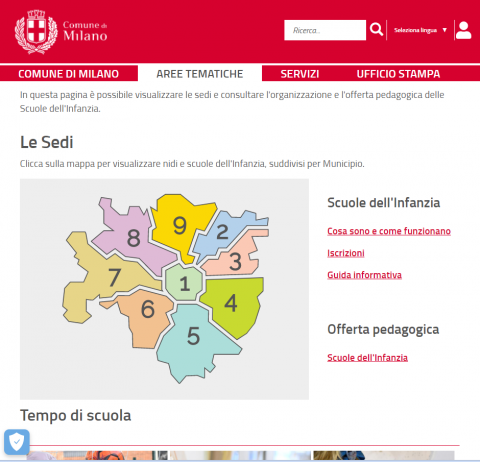Online Elections of Participatory Councils in Childcare Centres - Milan
Milan (Italy)
In December 2020 elections of Educational Unit Councils took place for the first time only via an on-line platform. Educational Unit Councils were settled in 2012 as participatory bodies aimed at engaging parents, educators and staff in decisions related to childcare centres that host pupil from 0 to 6 years-hold. Because of pandemic, in 2020 elections could have been difficult to manage. It was offered the chance to develop an online procedure that will be maintained also in future rounds (every two years).
On the election day, each voter (48,000 parents and 3,500 educators and staff) had to log-in via SPID, the Public System of Digital Identity provided by Italian Government. Automatically he/she was authorized to cast his/her ballot in the unit where his/her child was enrolled or in which he/she was professionally active. Voters could choose preferred candidates who had been collected in electoral lists according to a specific candidacy procedure.
During election, help desk services were available at the general phone number 020202 and via email. Election ran without issues and with the full satisfaction from voters.
Such new online opportunity enriches the already long list of online services connected with childcare centres. For some years, for example, it has been possible to find the closest childcare centre, to complete the enrollment procedure and check selection results fully online. A great help for parents who are generally professionally active and do not want to spend too much of their time with administrative issues.
The online election procedure is a step forward in enriching digital interaction opportunities in the field of childcare. Parents have always the possibility to interact personally with caregivers and managers in educational units, but it offers the opportunity to manage all administrative stuff in the easiest way. Parents are widely preserved from digital divide, and they really appreciate on-line services. Of course, there was also a significant reduction of administrative burden for staff because of election automation.
Accessibility, security, availability and usability so as privacy and data protection are granted by strict integration with other systems, such as city website and SPID, which satisfy all standards. A step-by-step support was assured via the general phone number 020202 and emails and that allowed feedbacks collection from users.
1) a meaningful reduction of administrative burden for staff in managing elections, so that time and costs were significantly reduced compared to traditional election;
2) a relevant participation rate, that shows the role it plays in enhancing citizens engagement.
